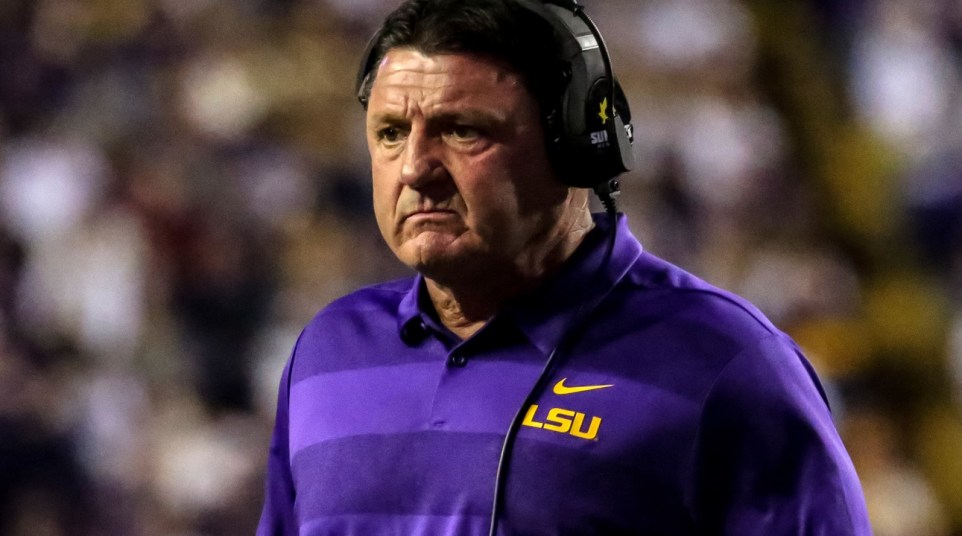
Once again, LSU has no offense against Alabama
No offense, LSU, but you have no offense.
At least not against Alabama. Not enough anyway.
Not nearly enough.
It’s happened before, most notably in a 21-0 loss in the National Championship Game after the 2011 season and 10-0 in Tiger Stadium two years ago.
It happened again Saturday night in a 29-0 loss to the top-ranked and overwhelming Crimson Tide in Tiger Stadium.
Going into the game, LSU thought this one might be different, that his might be the end of the seven-game losing streak to Alabama. LSU’s offense was going to have to produce, for sure, and there were indications during an impressive 7-1 start that the Tigers might be able to.
They weren’t going to score a ton of points against Alabama, and they weren’t going to march up and down the field all night long. But the goal was to grind out scoring drives bit by bit to keep the game close, stick around into the fourth quarter and maybe, just maybe, find a way to make those final few plays to pull off the upset.
The offensive line was as healthy as it has been all year. Transfer quarterback Joe Burrow has been efficient all season and has become a factor in the run game in recent weeks. Nick Brossette and Clyde Edwards-Helaire both had more rushing yards than the Crimson Tide’s leading rusher (Najee Harris) had. The receivers had been inconsistent, but there is talent in the group.
There was hope, but LSU hadn’t faced Alabama.
It turned out it was hopeless.
LSU’s 2018 offense had as many problems against Alabama as the 2016 and 2011 groups. Like those games, as this game unfolded, it always felt less competitive than the scoreboard suggested it was.
Alabama led just 6-0 after the first quarter and 9-0 late in the second quarter. But a back-breaking touchdown late in the second quarter made it 16-0 at halftime.
Still, it was just a two-score game. In theory, at least.
In reality, it was clear from the early going that the Tigers weren’t going to score 16 points. LSU’s offensive line was getting whipped up front when the Tigers tried to run, and Burrow had very little time to throw.
Brossette and Edwards-Helaire had nowhere to run, just like Leonard Fournette and Derrius Guice in previous losses to the Tide.
Burrow was under siege all night long, getting sacked 5 times for 29 yards in losses and harassed constantly, just as Danny Etling was under siege the last two seasons.
The futility of the Tigers’ offense, and the toll that it has taken on their collective psyche, was demonstrated during one fourth-quarter sequence.
The Tide led 22-0 – though the gap between the two teams felt much bigger – when the Tigers moved into position for their first serious scoring threat of the game.
It was a three-score margin, theoretically a deficit that could be overcome with most of the fourth quarter left to play.
LSU faced fourth-and-11 at the Alabama 15-yard line and coach Ed Orgeron opted for a field goal.
Sure, 11 yards probably seemed like a mile against the Tide defense, but a field goal would still have left a three-touchdown margin to overcome.
You can’t help but think Orgeron wasn’t flashing back to 2016 and his first game against Bama after being named interim head coach earlier that season. On that night, the defense had played outstanding and the game was scoreless entering the fourth quarter.
But that Tigers team never got on the scoreboard and lost 10-0. Now Orgeron had just begun his eighth quarter against Alabama in Tiger Stadium, and his team still had not scored a point.
He opted for a face-saving field goal, something that would end the scoreless streak at home but not appreciably improve LSU’s standing within the game.
But Orgeron knew the game was over.
Even if the people in charge of Daylights Savings Time had given the OK to give the Tigers another 60 minutes, they weren’t scoring 22 points.
Forget about the fact that a touchdown, if it actually happened, would have made it a two-score game with more than 10 minutes remaining. The Tigers’ offensive goals had shrunk to the point that all that was left was trying to avoid a shutout.
And they couldn’t do even that.
The reliable Cole Tracy, who had made 21 of 23 field goals and all 19 of his attempts from closer than 50 yards, missed from 33 yards.
The shutout lived.
And it survived another threat when Burrow threw an interception in the Tide end zone on the Tigers’ final offensive play.
Now LSU has lost eight consecutive games against Alabama and it’s starting to play with the Tigers’ minds.
There are several reasons for the streak, but until the Tigers can block, run and pass with at least a modest level of consistency that number is going to continue to grow.
